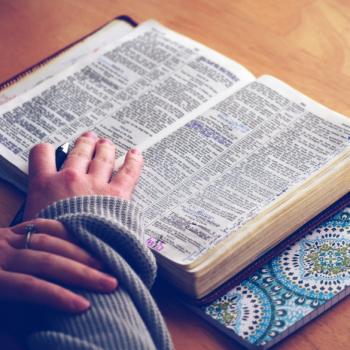
The book of Ruth is perhaps the most famous romance in all of scripture. Its depiction of two upstanding people, who find love despite barriers created by ethnicity, famine, poverty, and bitterness has captivated readers for thousands of years. And the committed, generous love of Ruth and Boaz for those around them has been an example to countless Christians.
Today, I want to consider an aspect of Ruth and Boaz’s kindness that isn’t highlighted as often. I believe that the author of Ruth paints the love and kindness that Ruth and Boaz show to one another and to those around them as representative of the love of God for his people. Their romance therefore embodies the biblical ideal of human love, which scripture says should be a microcosm of God’s love for his people as his bride.
So, let’s briefly consider the book of Ruth from this angle. First, we’ll highlight the love that Ruth and Boaz show in the book. Then, we’ll see how the book of Ruth relates their love to the love of God. And, finally, we’ll consider what implications that has for us today.
The Love and Kindness of Ruth and Boaz
Most Christians are already familiar with the story of Ruth and could likely rattle off several examples of kindness shown by both Ruth and Boaz. But, for the sake of review, let’s list some ways that Ruth and Boaz showed kindness to those around them:
- Ruth followed her mother-in-law Naomi back to Israel, when she could have stayed in Moab with her people. (Ruth 1)
- Boaz makes sure Ruth is protected and able to get plenty of food when she comes to glean in his field. (Ruth 2)
- Boaz does not take advantage of Ruth when she comes to him alone at night on the threshing floor, but instead sends her back to Naomi heavy-laden with food. (Ruth 3)
- Boaz marries Ruth in order to serve as a redeemer and provide offspring to continue Naomi’s family line, possibly despite negative effects for his own inheritance. (Ruth 4)
But, while these kindnesses are usually widely recognized, I think there’s one more act of kindness that we need to see in order to understand the book of Ruth fully.
Ruth’s Second Kindness
When Ruth comes to Boaz on the threshing floor, and asks him to marry her and serve as a redeemer, this is what he says to her (Ruth 3:10).
May you be blessed by the Lord, my daughter. You have made this last kindness greater than the first in that you have not gone after young men, whether poor or rich.
Boaz apparently thinks that Ruth has done a second kindness. And while we can guess that her first kindness was following Naomi back to Israel, it’s not quite clear what the second one is. Boaz seems to suggest that it has something to do with her choice to marry him. She could have married anybody she wanted, Boaz says—whether for love, or for money. And yet, she chose Boaz.
So is this a pity date situation? Is he praising her kindness for choosing to marry him instead of somebody younger, richer, or better looking? Not at all.
Ruth’s kindness at this stage is still directed at Naomi. After all, Boaz is the only one that can serve as a redeemer. He’s the only one that can provide a child to carry on Naomi’s family line. And, in fact, when Ruth and Boaz’s baby is born at the end of the book, the baby is said to be Naomi’s baby, not Ruth’s! Here’s Ruth 4:17.
And the women of the neighborhood gave him a name, saying, “A son has been born to Naomi.”
Thus, Boaz says that Ruth is doing a tremendous act of kindness by choosing to be with him, as it is only with him that she can provide Naomi with a child. And, thankfully, the fact that Boaz seems to be a pretty good catch himself helps us feel good about her decision.
Boaz and the Protection of God’s Wings
But, as I said at the beginning, the book of Ruth doesn’t just show us two exceptionally kind people. I believe it shows us two people who are demonstrating the redeeming love of God in their own lives. So, let’s take a look at how the book shows us this reality.
The first way we see this in Ruth is in a little phrase about finding protection underneath wings that comes up twice in the book. Listen to what Boaz says in Ruth 2, when Ruth asks him why he’s being so kind to her.
All that you have done for your mother-in-law since the death of your husband has been fully told to me… The Lord repay you for what you have done, and a full reward be given you by the Lord, the God of Israel, under whose wings you have come to take refuge!
Boaz says that Ruth has come to take refuge under the Lord’s wings, a common biblical idea (e.g., Psalm 91:4, Matt. 23:37). And he offers a blessing, maybe even an informal prayer, asking God to reward her for her kindness.
But then note what Ruth says to Boaz in chapter 3, when she’s asking him to marry her and serve as a redeemer.
I am Ruth, your servant. Spread your wings over your servant, for you are a redeemer.
Boaz prays that Ruth will find the protection she seeks under God’s wings, and Ruth turns around and asks him to take her under his wings. And of course, Boaz does just that. In other words, God is caring for Ruth and Naomi through the care and concern of Boaz. And Boaz shows Ruth a kind of love that mirrors the safe, kind, protective love of God.
Ruth, Boaz, and “Lovingkindness”
But there’s one other small clue in Ruth that the author wants us to see the love of God reflected in the love of Ruth and Boaz. And that’s the book’s use of the Hebrew word “hesed.” Often translated as “lovingkindness” or “steadfast love,” hesed usually refers to the enduring, covenant love of God for his people. In the words of the Jesus Storybook Bible, hesed is the “never stopping, never giving up, unbreaking, always and forever love” that God has for Israel and, later, for his church.
Interestingly, hesed appears three times in the book of Ruth. And, while it’s usually a descriptor for God’s love, the author of Ruth chooses to use it a little differently. In fact, the book of Ruth uses hesed once to describe the love of God for his children (1:8), once to describe the kindness of Boaz (2:20), and once to describe the kindness of Ruth (3:10).
In other words, the author is suggesting to us that the faithful, enduring, redemptive love of Ruth and Boaz for the people God has placed in their lives mirrors the faithful, enduring, redemptive love that God has for his people.
So Ruth and Boaz aren’t just examples of tremendous love and kindness. They’re pointers to the God who is the supreme example of lovingkindness, and they are instruments in his hands, reflecting his love back into the world.
Showing Godly Love
In the end, the story of Ruth should do at least two things for us. First, it should call us to follow in the example of Ruth and Boaz. The author clearly wants us to see them as people of unimpeachable character, who go above and beyond to show the love of God to the people around them. As Christians, our calling is to do the same. We are to “love one another as Jesus has loved us” (John 13).
But the second thing I think the story of Ruth should do for us is that it should encourage us that there is never a “small” act of love or service. The book of Ruth is a humble book, by biblical standards. There are no glorious victories on the battlefield, no spectacular miracles, no scenes of mass conversion. There’s just a handful of people allowing their love to carry them through a hard time.
And yet their faithfulness was seen and recognized by God—so much so that we’re still reading their story thousands of years later. And, while they never would have known it at the time, it was Ruth and Boaz’s line that eventually gave rise to King David and, eventually, King Jesus.
Similarly, it can be easy to think that our daily acts of service don’t mean much in God’s kingdom. It can be hard to care for small children, or an aging parent, or a sick spouse day in and day out. It can be hard to faithfully do a thankless job that doesn’t pay as well as it should. In these sorts of situations, we can often wonder whether our efforts are really making a difference in the world. After all, if we really wanted to advance the kingdom, we’d be off in a foreign country doing mission work or something.
But the book of Ruth reminds us that there is no act of love and service too small for God. He sees our love and care for others. He smiles when we reflect his love into the world. And we may never know how God, in his providence, may choose to use our humble acts of service and faithfulness as part of his redeeming plan.
Questions or thoughts?
Have any thoughts or questions about something I’ve said today? Please scroll down and leave a comment! I’d love to interact with you. You can also follow me on Twitter if you’d like to know when I post new articles. I’m doing a lot of writing about how the gospel impacts sexual ethics, but I also focus on issues of general interest as well.
Image Credit: Sebastian Klein / Unsplash












